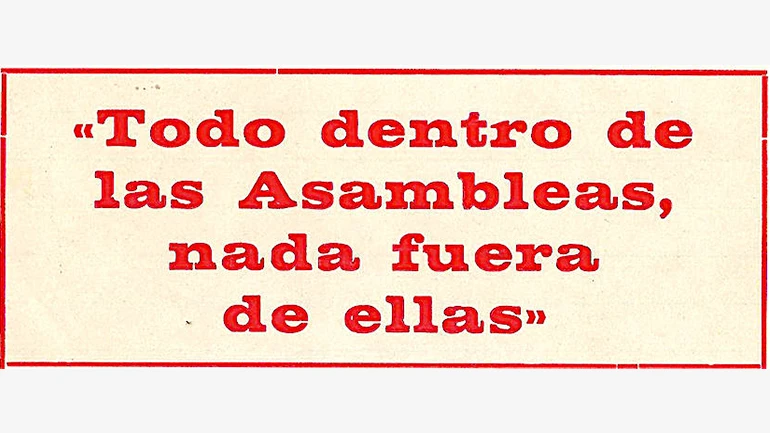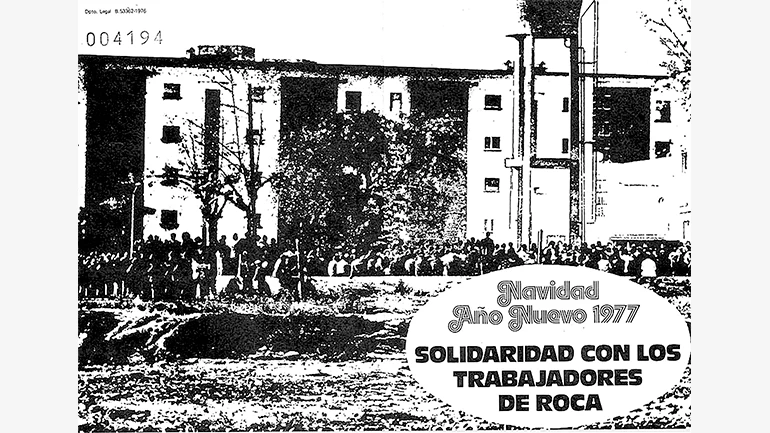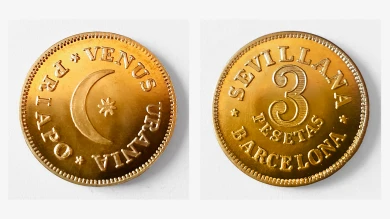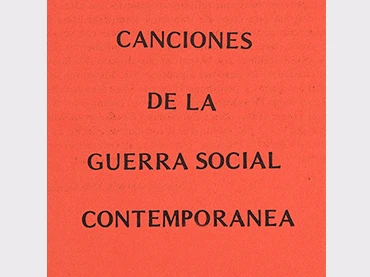Songs of the Contemporary Social War II
![“Companys anarquistas, sereu venjats!” [Compañeros anarquistas, ¡seréis vengados!], panfleto, ca. 1976](https://recursos.museoreinasofia.es/styles/large_landscape/public/Actividades/1_snippet.png.webp)
“Companys anarquistas, sereu venjats!” (Anarchist Comrades, You Will Be Vindicated!), pamphlet, ca. 1976
Held on 02 Nov 2021
Songs of the Contemporary Social War II is a project carried out inside the framework of the exhibition Pedro G. Romero. Verse-Composing Machines and comprises a large-scale installation and stage design conceived by Pedro G. Romero as a form of improvised square where live musical performances unfold. Inside these musical pieces, songs that Guy Debord, Alice Becker-Ho and other situationists wrote about Spain in the transition to democracy are performed and have been recovered by this artist and researcher.
In his work, Romero analyses historical events, life and the circulation of images that have represented and narrated key events in Spain’s history across the twentieth century. For such purposes, he draws on a vast archive of knowledge, disciplines and situations which bring together, schizoanalytically, sacramental iconography, the iconoclastic expression of early twentieth-century artistic avant-garde movements, flamenco, popular culture concepts and imagery, the economy, culture policies and forms of urban speculation, among others. This extensive repertory is resignified in an artwork that bursts forth indistinctly into installation, research, writing, curatorship and the connection with film and live arts.
Songs of the Contemporary Social War alludes to the title of a project created by Guy Debord, signed anonymously with the pseudonym “Some iconoclasts” and dated 1981. The initiative entailed editing a popular Spanish songbook, in a similar fashion to the one made by Federico García Lorca with flamenco dancer La Argentinita in 1931, which would form a kind of chronicle of the Spanish transition from the perspective of workers’ struggles for autonomy. This new mise en scène gives continuity to the activity Guy Debord. Songs of the Contemporary War, organised by the Museo Reina Sofía, whereby three choirs performed a selection of these songs live as a coda to the programme Guy Debord and René Viénet, from Lettrism to Situationism. Film Is Dead: If You Want, Let’s Proceed to the Debate.
This second manifestation features performers Rodrigo Cuevas, Gabriel de la Tomasa, Niño de Elche, Pollito de Graná, Oier Etxeberria, Julio Jara, Le Parody, Soleá Morente and Christina Rosenvinge. A pre-eminent selection of artists who, in the fields of flamenco, avant-garde art and independent music, continue Guy Debord’s objective to use this songbook to bring together classical, experimental and popular music.
The following synopses and clarifications on the authorship of songs that are part of this programme have been crafted from different sources, such as the Songs of the Contemporary Social War manifesto from 1981, lyrics from the compositions and the research of Pedro G. Romero.
Programme
From 2 to 7 November 2021
Gabriel de la Tomasa. Coplas of the Cádiz Roadblocks
Anonymous, Cádiz, 1977
The Moncloa Pacts (1977) were the first unspoken official manifestation of the agreement between Adolfo Suárez’s Government and the political-trade union opposition. The song interprets how these pacts led to the workers’ assembly movement being rendered irrelevant and thus avoiding any revolutionary intent between workers. At the same time, inspired by the strikes at the Roca factory in Gavà and the workers’ movement in Vitoria in 1976, on 2 November 1977 a mass strike was held by workers from Astilleros S.A. in Cádiz, whereby the city was filled with roadblocks. The protest lasted for two days, before the city was occupied by police — the events recounted in this song.
From 8 to 14 November 2021
El Corofón. The Romance of Capture and the Death of Oriol Solé Sugranyes
Anonymous, Barcelona, 1976
— With the music of Georges Moustaki. Le métèque, 1968
This song is performed by a choir with musical foundations. The importance of Oriol Solé Sugranyes (1948–1976) in the Barcelona workers’ movement during the final years of Francoism cannot be overstated given that he was part of its decisive moments and organisation and crucially continued the proletarian traditions of Francisco Ascaso, Buenaventura Durruti and Francisco Sabater, its greatest exponents. In Francoism’s latter years, Solé was in prison, but escaped in the historic Segovia jailbreak in 1976 along with 28 other prisoners. The Carlos Arias Navarro Government turned this escape into a State matter, and bad luck meant that the fugitives were spotted by one of the countless Guardia Civil patrols searching for them. The ballad becomes laconic at the end, without grandiose words or concessions: one falls, the battle goes on.
From 15 to 21 November 2021
Julio Jara. In Memory of Gladys del Estal
Anonymous, of Gypsy Origin, 1979
Gladys del Estal was an environmental activist killed by a guardia civil officer during a crackdown of the protest organised by Basque anti-nuclear committees in Tudela. Her death moved the population to the extent that in the cities of Pamplona and San Sebastián barricades were erected and a general strike was declared, the most violent in the Basque Country since the Vitoria and Basauri protests in 1976, which left a trail of deaths and casualties at a time when the right to assemble, protest and strike was still prohibited. The song, a rumba, evinces how nobody expresses feelings of retribution through a long history of repression, linked to the Guardia Civil, quite like the gypsies. Equally, it attempts to upend the image of gypsies as marginal figures with little concern for social issues.
From 22 to 28 November 2021
Soleá Morente. Song for the Parla Uprising
Anonymous, Madrid, 1979
During the 1979 election campaign, the general atmosphere of discontent and social protests sparked a series of altercations in different towns, one of them Parla. In this municipality on the outskirts of Madrid, neighbourhood protests triggered by insufficient water supplies caused three days of intense violence. The present song commemorates — to the same tune with which the defence of the Puente de los Franceses in the Peninsular War was celebrated — the roadblock resistance on carretera N-401, a road used by police convoys from Madrid. During the days of the uprising, Parla was the stage for a key revolutionary weapon: direct communication and the rejection of mediators and officers. The revolt ended with 380 arrested, 40 or so injured and one dead.
From 29 November to 5 December 2021
Rodrigo Cuevas. The Segovia Prison
Prisoners’ Song, 1980
Many libertarians felt it was shameful to be content with the crumbs of liberation from Franco’s dictatorship, an accusation aimed at members of the National Confederation of Labour (CNT), an organisation with an anarcho-syndicalist ideology. Conversely, they would not acquiesce in anything that was not the revolution, and after forty years of counter-revolution they would not settle for less. Following the example of activist Oriol Solé Sugranyes and his comrades, members of anarchist revolutionary groups, the libertarians traced a path that led them to the Segovia prison for political prisoners. The song recalls their will to prevail and an awareness of the risks they ran and accepted.
From 6 to 12 December 2021
Christina Rosenvinge. Ballad of Manuel Nogales Toro
Prisoners’ Song, 1980
A delegate on the Board of the SEAT factory and a member of the Revolutionary Army of Workers’ Assistance (ERAT), Manuel Nogales Toro embodies “the wrath of the whole Spanish proletariat” in Debord’s view. He was arrested in 1978 accused of various theft crimes against banking organisations and companies. The expropriations — “the first tax on the bourgeois”, according to an ERAT communiqué — were part of this settling of scores with the ruling class. In return, certain measures were taken, such as the construction of the Herrera de la Mancha prison, where “the transition ended”, as the song ironically utters, or the use of trade unions to break up strikes. The music belongs to the corrido of Juan sin tierra (Landless Juan), a track written by Mexican composer Juan Saldaña in 1956 with versions by Chilean singer-songwriter Víctor Jara and Spanish group SKA-P.
From 10 to 16 January 2022
Niño de Elche. Song for the SEAT Workers Serving Time in Segovia
Anonymous, Compiled in Barcelona, 1980
This focus of this song is on the five proletarians who formed the so-called Revolutionary Army of Workers’ Assistance (ERAT), dedicated to expropriating from companies and banks to help strikers and workers laid off by the SEAT company. In 1978, its members were arrested, accused of belonging to an armed gang and, two years later, sentenced to seven years in prison, serving their sentence in Segovia Prison. “The nationalist hymn of Els Segadors appears here freed from the reactionary weight of Catalanism, serving a worthier cause. The interest in weapons warrants particular attention and is constantly repeated in the form of a chorus”, the message notes at the end of the video clip to the song.
From 17 to 23 January 2022
Pollito de Graná. The Uprising of 29 January
Popular, 1981
The relatively unstable politics of President Adolfo Suárez in relation to Spain’s Autonomous Regions, the legalisation of divorce and, primarily, his failure to suppress Basque insurgence, caused the most riotous uprising in Spain’s history, according to the lyrics to this song. It was an uprising with no hearsay or rumours and was broadly discredited, yet it still continued its inexorable course: the Army would discharge its leader from the Government; bishops met and discovered they were enemies of divorce; the Government revealed that a detained member of ETA had just been tortured to death the previous day, sparking a revolt in the Basque Country; police torturers were prosecuted and immediately after police chiefs resigned. “Democracy, democracy can no longer walk. Because it is lacking, because it lacks military consent”, recites this song, compiled by Debord, to the rhythm of La Cucaracha.
From 31 January to 6 February 2022
Oier Etxeberria. Probe into the Deaths of Zapa and Roberto
Anonymous, Basque Country, 1978
The song alludes to the execution of two members of the Autonomous Anti-Capitalist Commandos — the most radical armed Basque organisation of the time — which took place in Mondragón on 16 November 1978. It was perhaps the most notorious case in the application of the Law of Flight, a kind of extrajudicial execution which allowed the murder of a prisoner to be concealed by simulating their escape. The response to the execution was an extremely violent general strike
From 21 to 27 February 2022
Le Parody. El Tejero
Popular, 1981
The storming of Congress, under the orders of Lieutenant Colonel Antonio Tejero, culminated in an uprising that had been making headway since 17 December 1980, the date on which Tejero laid out his intentions in the pages of the magazine El Alcázar, plans which all leading figures from the political parties chose to ignore. This song relates how the coup led the political parties to cling to the constitutional monarchy. Therefore, as interpreted in the Songs of the Social Contemporary War pamphlet, the generals momentarily sacrificed the hastiest and most extremist elements of their own plot to make the whole political spectrum aware, from UCD to CNT, that they had to choose between calm submission or “the sound of sabres”.
![“Companys anarquistas, sereu venjats!” [Compañeros anarquistas, ¡seréis vengados!], panfleto, ca. 1976](https://recursos.museoreinasofia.es/styles/large_landscape/public/Actividades/1_snippet.png.webp)


Más actividades

Aesthetics of Peace and Desertion Tactics
8 October 2025 – 24 June 2026
The study group Aesthetics of Peace and Tactics of Desertion: Prefiguring New Pacifisms and Forms of Transitional Justice proposes a rethinking—through both a theoretical-critical and historical-artistic lens—of the intricate network of concepts and practices operating under the notion of pacifism. A term not without contestation and critical tension, pacifism gathers under its name a multiplicity of practices—from anti-militarism and anti-war movements to non-violence activism—while simultaneously opening urgent debates around violence, justice, reparation, and desertion. Here, pacifism is not conceived as a moral doctrine, but as an active form of ethical and political resistance capable of generating aesthetic languages and new positions of social imagination.
Through collective study, the group seeks to update critical debates surrounding the use of violence and non-violence, as well as to explore the conflict of their representation at the core of visual cultures. In a present marked by rearmament, war, genocide, and the collapse of the social contract, this group aims to equip itself with tools to, on one hand, map genealogies and aesthetics of peace—within and beyond the Spanish context—and, on the other, analyze strategies of pacification that have served to neutralize the critical power of peace struggles. Transitional and anti-punitive justice proposals will also be addressed, alongside their intersections with artistic, visual, and cinematic practices. This includes examining historical examples of tribunals and paralegal activisms initiated by artists, and projects where gestures, imaginaries, and vocabularies tied to justice, reparation, memory, and mourning are developed.
It is also crucial to note that the study programme is grounded in ongoing reflection around tactics and concepts drawn, among others, from contemporary and radical Black thought—such as flight, exodus, abolitionism, desertion, and refusal. In other words, strategies and ideas that articulate ways of withdrawing from the mandates of institutions or violent paradigms that must be abandoned or dismantled. From feminist, internationalist, and decolonial perspectives, these concepts have nourished cultural coalitions and positions whose recovery today is urgent in order to prefigure a new pacifism: generative, transformative, and radical.
Aesthetics of Peace and Tactics of Desertion, developed and led by the Museo Reina Sofía’s Studies Management, unfolds through biweekly sessions from October to June. These sessions alternate between theoretical discussions, screenings, work with artworks and archival materials from the Museo’s Collection, reading workshops, and public sessions. The group is structured around sustained methodologies of study, close reading, and collective discussion of thinkers such as Judith Butler, Elsa Dorlin, Juan Albarrán, Rita Segato, Sven Lütticken, Ruth Wilson Gilmore, and Franco “Bifo” Berardi; historical episodes such as the anti-nuclear and anti-arms race movement in Spain; and the work of artists and activists including Rojava Film Commune, Manuel Correa and the Oficina de Investigación Documental (Office for Documentary Investigation), and Jonas Staal, among other initial cases that will expand as the group progresses.

Institutional Decentralisation
Thursday, 21 May 2026 – 5:30pm
This series is organised by equipoMotor, a group of teenagers, young people and older people who have participated in the Museo Reina Sofía’s previous community education projects, and is structured around four themed blocks that pivot on the monstrous.
This fourth and final session centres on films that take the museum away from its axis and make it gaze from the edges. Pieces that work with that which is normally left out: peripheral territories, unpolished aesthetics, clumsy gestures full of intent. Instead of possessing an institutional lustre, here they are rough, precarious and strange in appearance, legitimate forms of making and showing culture. The idea is to think about what happens when central authority is displaced, when the ugly and the uncomfortable are not hidden, when they are recognised as part of the commons. Film that does not seek to be to one’s liking, but to open space and allow other ways of seeing and inhabiting the museum to enter stage.

Intergenerationality
Thursday, 9 April 2026 – 5:30pm
This series is organised by equipoMotor, a group of teenagers, young people and older people who have participated in the Museo Reina Sofía’s previous community education projects, and is structured around four themed blocks that pivot on the monstrous.
The third session gazes at film as a place from which to dismantle the idea of one sole history and one sole time. From a decolonial and queer perspective, it explores films which break the straight line of past-present-future, which mix memories, slow progress and leave space for rhythms which customarily make no room for official accounts. Here the images open cracks through which bodies, voices and affects appear, disrupting archive and questioning who narrates, and from where and for whom. The proposal is at once simple and ambitious: use film to imagine other modes of remembering, belonging and projecting futures we have not yet been able to live.

Remedios Zafra
Thursday March 19, 2026 - 19:00 h
The José Luis Brea Chair, dedicated to reflecting on the image and the epistemology of visuality in contemporary culture, opens its program with an inaugural lecture by essayist and thinker Remedios Zafra.
“That the contemporary antifeminist upsurge is constructed as an anti-intellectual drive is no coincidence; the two feed into one another. To advance a reactionary discourse that defends inequality, it is necessary to challenge gender studies and gender-equality policies, but also to devalue the very foundations of knowledge in which these have been most intensely developed over recent decades—while also undermining their institutional support: universities, art and research centers, and academic culture.
Feminism has been deeply linked to the affirmation of the most committed humanist thought. Periods of enlightenment and moments of transition toward more just social forms—sustained by education—have been when feminist demands have emerged most strongly. Awareness and achievements in equality increase when education plays a leading social role; thus, devaluing intellectual work also contributes to harming feminism, and vice versa, insofar as the bond between knowledge and feminism is not only conceptual and historical, but also intimate and political.
Today, antifeminism is used globally as the symbolic adhesive of far-right movements, in parallel with the devaluation of forms of knowledge emerging from the university and from science—mistreated by hoaxes and disinformation on social networks and through the spectacularization of life mediated by screens. These are consequences bound up with the primacy of a scopic value that for some time has been denigrating thought and positioning what is most seen as what is most valuable within the normalized mediation of technology. This inertia coexists with techno-libertarian proclamations that reactivate a patriarchy that uses the resentment of many men as a seductive and cohesive force to preserve and inflame privileges in the new world as techno-scenario.
This lecture will address this epochal context, delving into the synchronicity of these upsurges through an additional parallel between forms of patriarchal domination and techno-labor domination. A parallel in which feminism and intellectual work are both being harmed, while also sending signals that in both lie emancipatory responses to today’s reactionary turns and the neutralization of critique. This consonance would also speak to how the perverse patriarchal basis that turns women into sustainers of their own subordination finds its equivalent in the encouraged self-exploitation of cultural workers; in the legitimation of affective capital and symbolic capital as sufficient forms of payment; in the blurring of boundaries between life and work and in domestic isolation; or in the pressure to please and comply as an extended patriarchal form—today linked to the feigned enthusiasm of precarious workers, but also to technological adulation. In response to possible resistance and intellectual action, patriarchy has associated feminists with a future foretold as unhappy for them, equating “thought and consciousness” with unhappiness—where these have in fact been (and continue to be) levers of autonomy and emancipation.”
— Remedios Zafra

27th Contemporary Art Conservation Conference
Wednesday, 4, and Thursday, 5 March 2026
The 27th Contemporary Art Conservation Conference, organised by the Museo Reina Sofía’s Department of Conservation and Restoration, with the sponsorship of the Mapfre Foundation, is held on 4 and 5 March 2026. This international encounter sets out to share and debate experience and research, open new channels of study and reflect on conservation and the professional practice of restorers.
This edition will be held with in-person and online attendance formats, occurring simultaneously, via twenty-minute interventions followed by a five-minute Q&A.

